A look at the inaugural Riga Jurmala classical music festival, and what Canadian classical music festivals can learn from it.
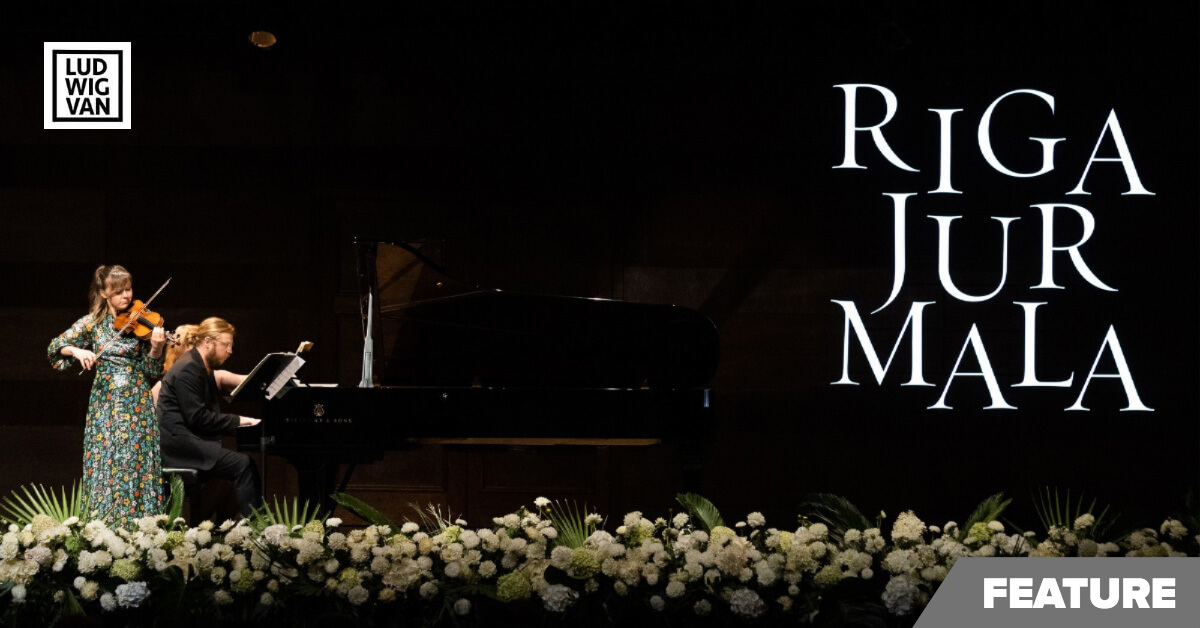
You can drive, of course, and the busy people do, but I liked taking the train to concerts in Jurmala, a seaside town thirty minutes from Riga, Latvia’s capital city. On the train, you sit among grandmothers on their way to invest in ice cream, next to a teenage boy huffing into his phone about going fishing “I’ll be back tonight. We won’t drink.” And it is normal that there are people on the train going to the symphony.
In Jurmala, if you get off at the wrong station, there’s a two-kilometre walk on a white beach next to a Baltic pine forest interrupted by decaying Soviet resorts like crashed spaceships and the new high-walled houses of oligarchs. The water is so shallow that swimmers wade out and stand for hundreds of meters, populating the warm, slate-coloured sea. Then you brush off your feet and walk up a wooden path through moss and wild rosemary to an eclectic town packed with tourists during the day and empty at night. For now, a few old wooden homes survive with their decorative lace cutouts and stained glass-like candied fruit. A hedgehog might actually run across your path.
There are two concert halls, and most of the Riga-Jurmala festival takes place here. The smallest is a neoclassical building from the 1930s with a white colonnade and a few hundred seats, and the biggest is a sunken outdoor amphitheatre from the 1960s in teal steel, covered in acoustic panels in faded pastel. It seats two thousand on monolithic benches (the Latvian National Opera, with nine hundred seats in Riga, hosts only a handful of concerts.) Draped around them are new pavilions; discreet but unavoidably luxurious, cafes and bars in starched white and gleaming glass. Inside both halls, the stage is protected by a metre-wide moat of white carnations, though this did not stop an Austrian man from bounding up to give stuffed animals to soloists who were already struggling with bouquets of such mass that they seemed intended to make encores impossible (it never worked.)
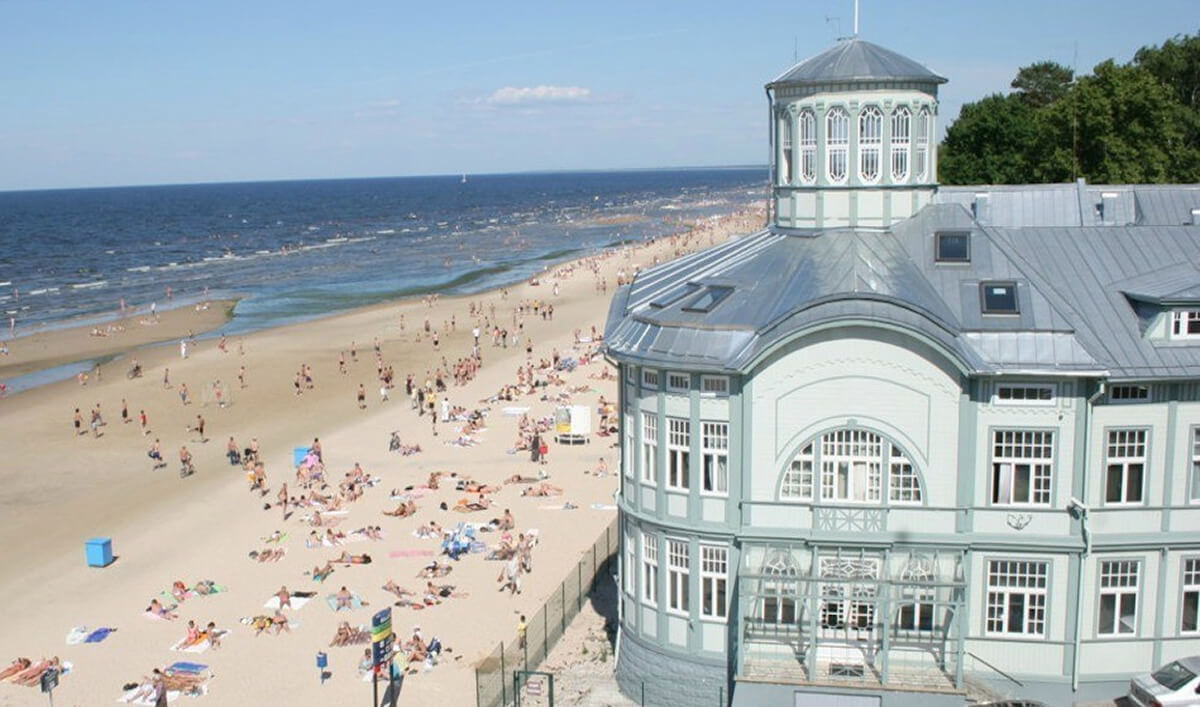
Living in Montreal, I’ve missed performances with a sizable Russian presence in the audience and forgotten the splendid ease of these classical music natives. They talk and eat as if the pianist has just smashed the window and interrupted lunch; phone calls are fine, as long as they discuss emergencies like what’s for dinner, and ringtones should be enjoyed like a howling child demonstrating healthy lungs. But it was exciting to see so many children at the concerts, like a girl who sat next to me and air conducted for two hours, including the encores. She looked about ten. (The Latvians behaved differently, more about that later.)
Riga-Jurmala has set out to dazzle like cut crystal placed where the light will hit it. The festival happens over four weekends in August with five concerts each, about 50 hours of music. “An orgy of culture from Friday evening to Sunday evening.” Says Associate Artistic Director Miguel Estaban. It’s a different leading orchestra each weekend in combination with a few soloists, some of whom also play recitals. The weekend I attended, it was Zubin Mehta conducting the Israel Philharmonic Orchestra, with pianists Yuja Wang, Jan Lisiecki, and Denis Kozhukhin, and violinist Alexandra Conunova.
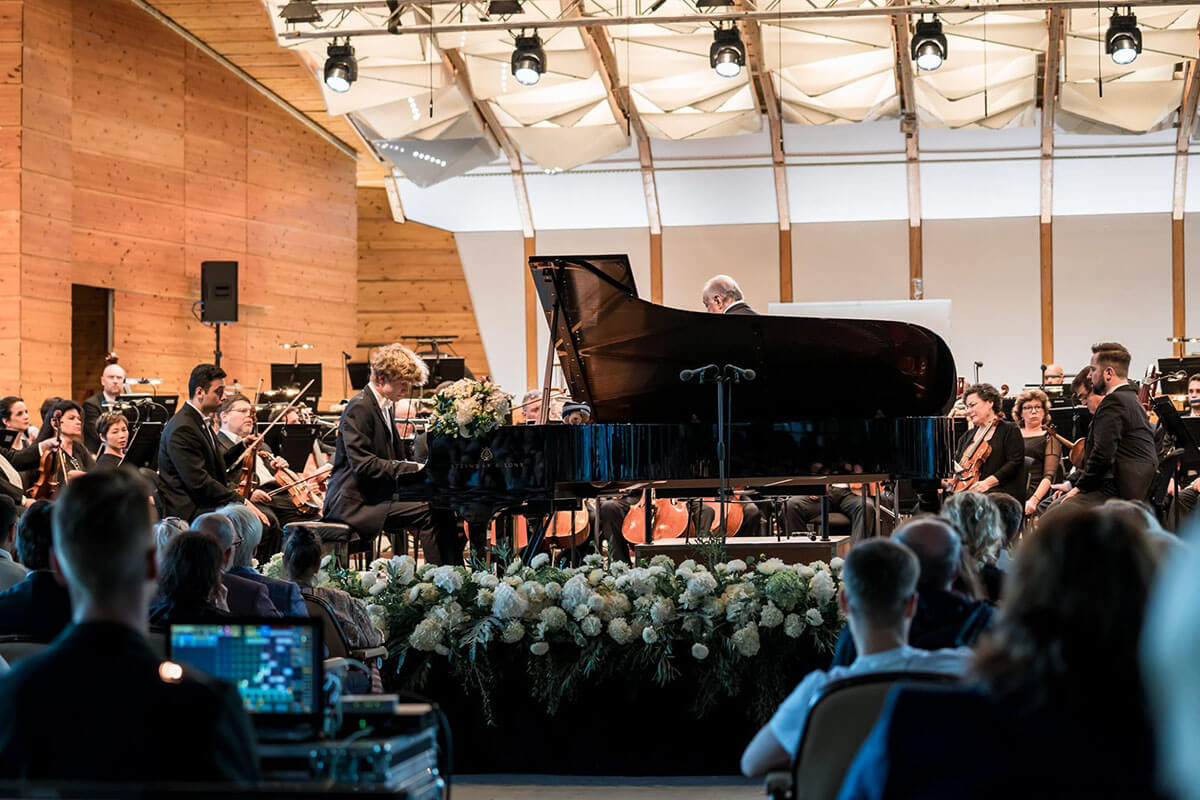
The concerts were conservative and world-class, and the halls sound remarkably good for their time. It’s hard to complain about note-perfect Schumann, Chopin, Rachmaninoff, or Beethoven, but there’s rather a lot of it these days. As the youngest at 24, Lisiecki’s old-fashionedness was the oddest. He has the weightless virtuosity of a millipede on amphetamines, but only expressed his personality in a Chopin Nocturne and Scherzo.
The great discoveries of the weekend were Kozhukhin and Conunova. Looking like Aquaman’s jazz musician brother joined the Orthodox priesthood, Kozhukhin gave a recital of joyful and indulgent relish, from Mendelssohn to Gershwin via Grieg, building to a thrashing of the overpowered concert grand like a Corvette revving in a parking lot, and then loped off. The next day, Conunova joined for a second swim in the 20th century (it seemed incredible) with Poulenc’s Sonata for violin and piano. If everybody could hear it like this! Melancholic, unpredictable and affectionate, they performed it like siblings. Conunova has one of those rare named violins that sound worth it, with a captivating husky tone. They inexplicably ended the concert with Strauss.
The absence of Latvian performers was expected since the public is regularly fed by visits from the most famous ones like Mariss Jansons and Elīna Garanča, but Estaban explained that “as far as Latvian compositions, you then need to find a soloist or an orchestra who is willing to program it.” While festival CEO Zane Čulkstēna put the question of rep in perspective. “The agreement we have with the artistic directors is, let’s start it as traditional and, in a way, as safe as possible. In three years from now, I would like to have world premieres. In the future, I would like to have a separate part like new arrivals or more interdisciplinary programs, but it will take time.”
The festival is technically a relaunch, since about half the board were involved from 2016-2018 in founding something called Baltic Music Seasons, which presented five concerts a summer but had no artistic director. Sometimes the concert program only appeared at intermission. “It was badly organized, but those two years proved that there is a need,” said Čulkstēna. The board hired Martin Engstroem as Artistic Director, and hired her to manage a larger and more professional team who had only two months to put the 2019 program together. “I don’t know how it was possible — largely due to Martin’s contacts.”
Engstroem founded the Verbier festival, which runs in July, and he was also “headhunted” to direct the Tsinandali Festival in Georgia, in September, right after Riga. “What does it remind me of here?” said Zvi, an IPO percussionist. “Verbier, it’s almost all the same people playing!” But not many Latvians go to Verbier. This year, 85 percent of the tickets went to locals (the organizers want to get to 50/50 foreigners/locals) and they seemed pleased not to climb a mountain to hear them. “I’m so happy to be able to hear artists like these. They don’t come to Latvia.” said Inga, a viola student, at intermission and adding “but we don’t get to hear Latvian composers very much.” She recommended I check out Pēteris Vasks.
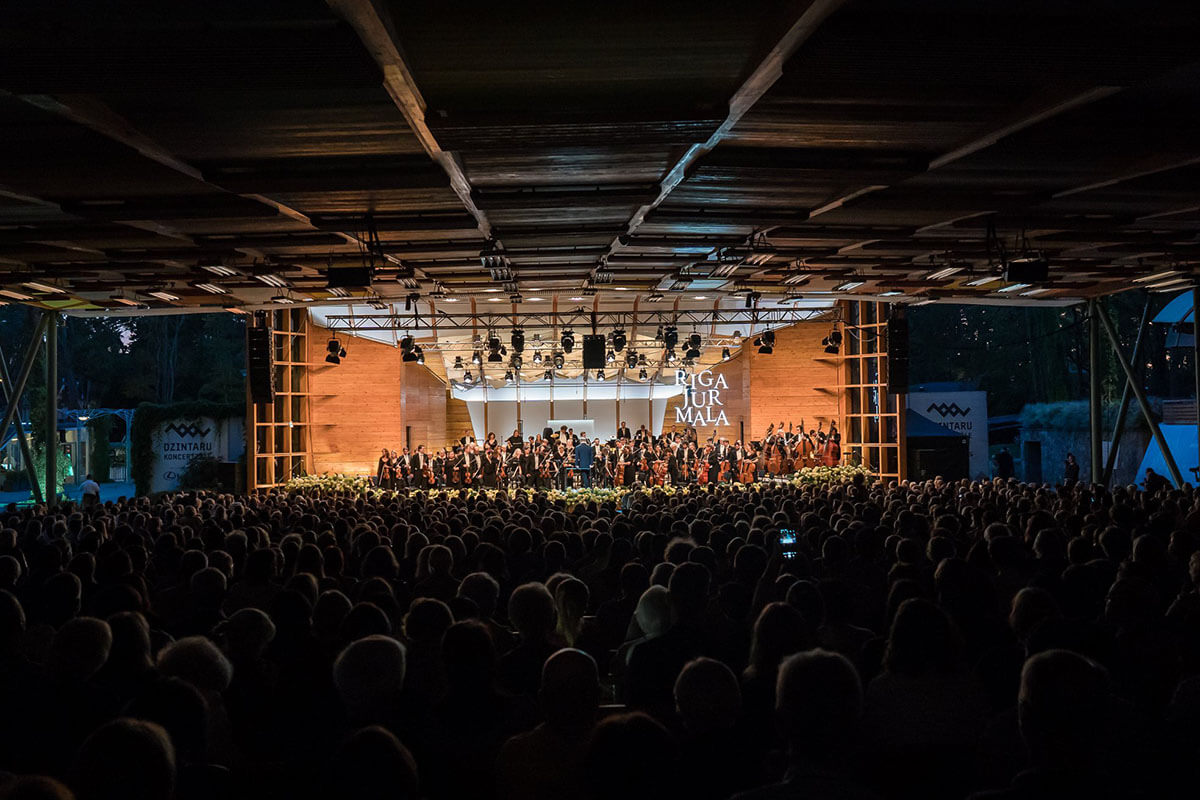
Polish journalist Jacek Kornak didn’t mind the lack of contemporary music: “You come for the beach, not for a nervous breakdown.” While Boris Avramecs, a music professor and founder of the Riga Early Music Center, suggested over a dozen living Latvian composers that could be involved: Ēriks Ešenvalds, Santa Ratniece, Jānis Petraškevičs, Andris Dzenītis, Rihards Dubra, Gundega Šmite, Mārtiņš Viļums, Juris Ābols, Gustav Friedrichsohn, Ruta Paidere, Platon Buravicky, Jēkabs Jančevskis, and Krists Auznieks.
(Yes, it should be suspicious that the audience members I’m quoting are both musicians, but about 1 in 10 Latvians have formal musical training.)
Avramecs related the festival to a tradition of summer seasons in Jurmala. He recalled how, in the 60s, leading Soviet orchestras would come to play there, “one from Leningrad and the other from Moscow. For example [Kirill] Kondrashin, Gennady Rozhdestvensky; the 1966 all union conductor competition winner Yuri Timerkanov; Neeme Järvi, [David] Oistrakh. In other words, the best! And the hall was always full. We students climbed over the fence.”
This history has both positive and negative associations. Like many former Soviet republics, tensions with Russia have increased in the last decade over Georgia, Ukraine, and now Crimea. (At a pre-concert cocktail, NATO military exercises came up naturally like bubbles.) And the festival decided to avoid Russian. “This is absolutely intentional,” explained Čulkstēna. “For the first two years of this pilot project [Baltic Music Seasons], everything was in Russian. But we have one official language and it’s Latvian, and we’re working with international guests. What is important is accessibility.” And yet the strength of the classical tradition here means that concerts take on a special, even political charge. “Classical music is probably the only art genre where you can see a proper integration,” she said. “Normally it’s very divided — not in the sense of friction — but Latvians have their own school, Russians have their own school.” Even during a single night, this integration comes and goes — a dynamic you felt in the two applause styles. Russian: massive waves, to the beat, sometimes during the music. Everyone else: random clapping, and hissing at Russians when they try to applaud during a piece.
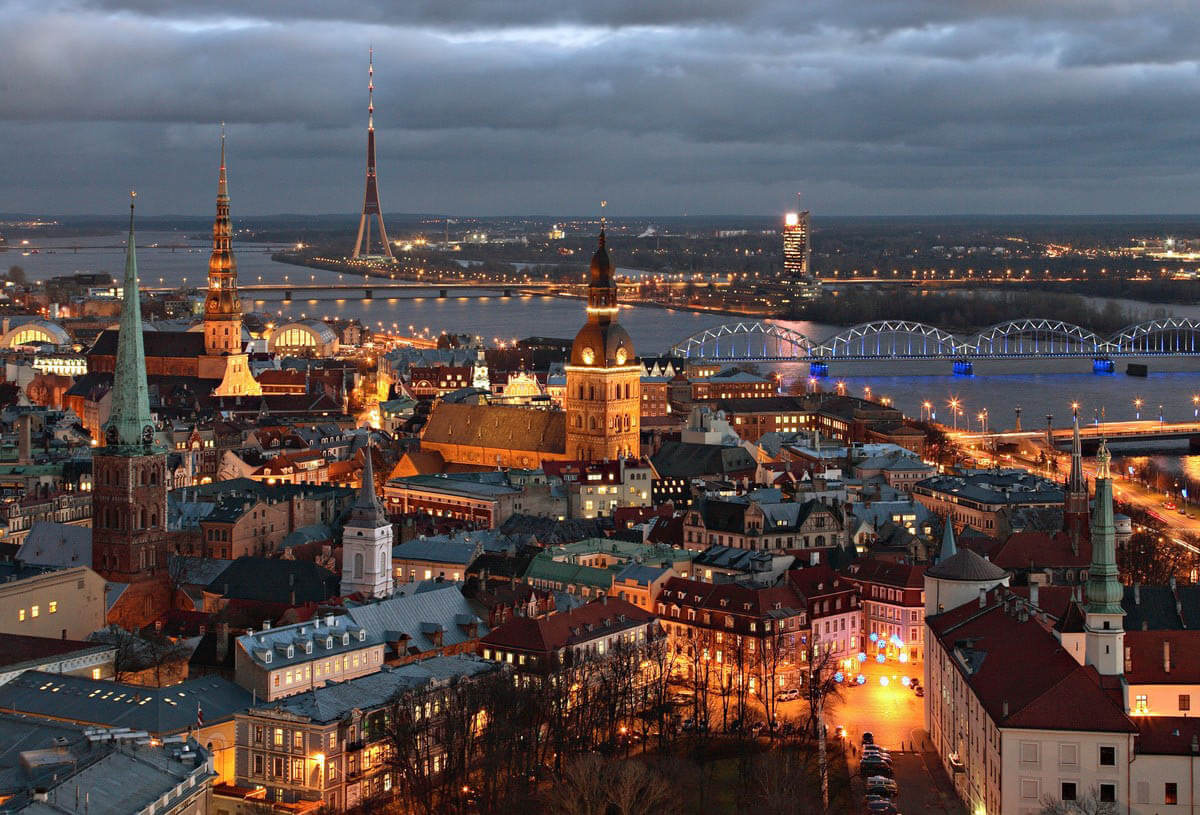
It’s one of many lessons from the festival for Canadians thinking about what kind of musical scene we want to build, or anyone wondering about the roles for music in society. The organizers offered some practical advice too. Estaban emphasized the need for new festivals to fill a gap. “Look at a 200-300km circumference and see what’s missing.” And to be aware of what kind of culture a festival creates, especially in the things that the public doesn’t see but benefits from. Which Conunova confirmed when she told me, “you get off the plane and there is a Mercedes waiting.” This was a lesson from Verbier where Engstroem and Estaban began with limited budgets (hard to take seriously in Switzerland but let’s believe them) and compensated for the artists low fees by putting them up for longer and encouraging them to bring the whole family, turning it into a social event. In Riga-Jurmala the intensity of the weekend produces a similar effect. It’s particularly noticeable when you are in the middle of an orchestra at the open bar.
For Čulkstēna, four ingredients were key: an artistic director with a clear concept and the spine to stand up for it; a local team willing to go beyond their job descriptions and schedules (do I detect the need for a union?); smart and devoted trustees (Petr Aven, chair of the board and founder of Russia’s biggest commercial bank, replies to her emails “in 15 minutes”); and a sense that the event really belongs somewhere and hasn’t been flown in. She also described a massive outreach effort to give discount codes to seniors groups, professional music associations, music students and teachers. Riga was plastered with billboards and posters.
Planning for the next two years is mostly finished. They want to increase the international audience while keeping them youthful (under 45) and they’re keeping the orchestra-anchored model, but Čulkstēna wants to add premieres and contemporary music, even if they are separate. “That’s the part I’m most interested in.” And that will take spine, too. In its first year, Riga-Jurmala is already a huge achievement, but it has the potential to really distinguish itself. This year they have proven they are world-class; next year, can they prove that they are brave?
LUDWIG VAN TORONTO
Want more updates on classical music and opera news and reviews? Follow us on Facebook, Instagram or Twitter for all the latest.
- REPORT | Ukrainian Pianist Crowned Winner Of 2022 Honens Competition - October 29, 2022
- REPORT | The 10th Honens International Piano Competition: Finals I - October 28, 2022
- REPORT | The 10th Honens International Piano Competition: Semifinals IX-X - October 25, 2022



